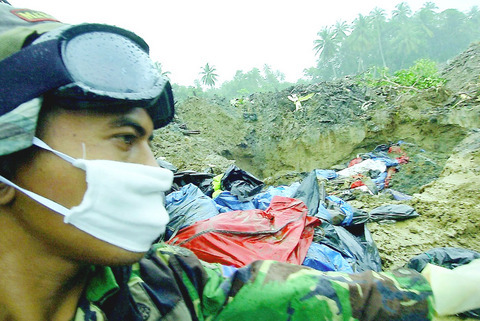Relief organizations said yesterday that Indonesia's demand that foreign aid workers take army escorts to tsunami-stricken Aceh Province would create bottlenecks in aid delivery and blur the lines between the military and humanitarian efforts.
Rich creditor nations, meanwhile, offered to halt repayments on billions of dollars owed by tsunami-hit nations. Indonesia, Sri Lanka and the Seychelles expressed initial interest in the Paris Club's proposal, but Indonesia's foreign minister voiced concern yesterday that accepting the offer might hurt the country's credit rating and that it preferred grants instead.

PHOTO: AFP
Relief groups reported having no security problems in Aceh, where rebels have fought a low-level separatist war against government troops for three decades, and some worried that the new restrictions could harm their reputation for independence.
"We discourage such actions because it blurs the distinction between humanitarian and military efforts here," said Eileen Burke of Save the Children.
Rebel leaders reaffirmed their commitment to a ceasefire they declared hours after the Dec. 26 earthquake that sent killer waves fanning out across the Indian Ocean, killing more than 150,000 people in 11 nations. Indonesia's vice president yesterday welcomed the ceasefire offer.
"Indonesia will also make efforts toward it," Jusuf Kalla said at the vice presidential palace.
Indonesia's moves -- which include an order that aid workers declare their travel plans or face expulsion -- highlight its sensitivities over foreign involvement in the humanitarian effort, especially that of foreign troops from the US, Australia, Singapore, Japan and other countries. The security measures represent an effort by the government to regain control of Aceh and the disaster zone along Sumatra island's western coast, where more than 106,000 people were killed and entire towns and local government infrastructure wiped out.
Before the disaster, the military controlled Aceh with a tight grip and foreigner journalists and aid workers were barred. Widespread rights abuses were reported. The Indonesian government says it wants the foreign troops to leave the country by late March.
Also see stories:

Auckland rang in 2026 with a downtown fireworks display launched from New Zealand’s tallest structure, Sky Tower, making it the first major city to greet the new year at a celebration dampened by rain, while crowds in Taipei braved the elements to watch Taipei 101’s display. South Pacific countries are the first to bid farewell to 2025. Clocks struck midnight in Auckland, with a population of 1.7 million, 18 hours before the famous ball was to drop in New York’s Times Square. The five-minute display involved 3,500 fireworks launched from the 240m Sky Tower. Smaller community events were canceled across New Zealand’s

The Ministry of Foreign Affairs (MOFA) yesterday said it is closely monitoring developments in Venezuela, and would continue to cooperate with democratic allies and work together for regional and global security, stability, and prosperity. The remarks came after the US on Saturday launched a series of airstrikes in Venezuela and kidnapped Venezuelan President Nicolas Maduro, who was later flown to New York along with his wife. The pair face US charges related to drug trafficking and alleged cooperation with gangs designated as terrorist organizations. Maduro has denied the allegations. The ministry said that it is closely monitoring the political and economic situation

UNRELENTING: China attempted cyberattacks on Taiwan’s critical infrastructure 2.63 million times per day last year, up from 1.23 million in 2023, the NSB said China’s cyberarmy has long engaged in cyberattacks against Taiwan’s critical infrastructure, employing diverse and evolving tactics, the National Security Bureau (NSB) said yesterday, adding that cyberattacks on critical energy infrastructure last year increased 10-fold compared with the previous year. The NSB yesterday released a report titled Analysis on China’s Cyber Threats to Taiwan’s Critical Infrastructure in 2025, outlining the number of cyberattacks, major tactics and hacker groups. Taiwan’s national intelligence community identified a large number of cybersecurity incidents last year, the bureau said in a statement. China’s cyberarmy last year launched an average of 2.63 million intrusion attempts per day targeting Taiwan’s critical

‘SLICING METHOD’: In the event of a blockade, the China Coast Guard would intercept Taiwanese ships while its navy would seek to deter foreign intervention China’s military drills around Taiwan this week signaled potential strategies to cut the nation off from energy supplies and foreign military assistance, a US think tank report said. The Chinese People’s Liberation Army (PLA) conducted what it called “Justice Mission 2025” exercises from Monday to Tuesday in five maritime zones and airspace around Taiwan, calling them a warning to “Taiwanese independence” forces. In a report released on Wednesday, the Institute for the Study of War said the exercises effectively simulated blocking shipping routes to major port cities, including Kaohsiung, Keelung and Hualien. Taiwan would be highly vulnerable under such a blockade, because it